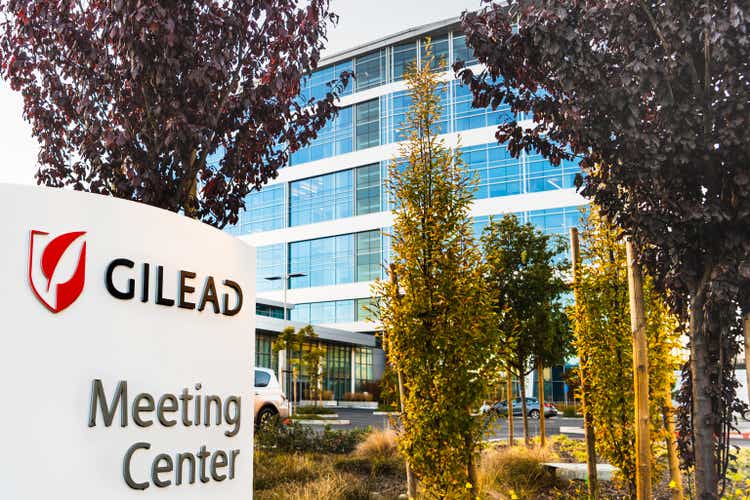Sundry Photography
Shares of Gilead Sciences (NASDAQ:GILD) have been settling in the low-sixties again after shares saw a bit of momentum in recent weeks, in contrary to the rest of the market. Since the spring, shares have been range bound between $60 and $65 per share as in July I concluded that the situation was improving here.
This came after the company started strong in 2022, albeit that it compares to an underwhelming original outlook. The stronger performance looks interesting, but non-pandemic related sales were stronger than expected, and investors rather would like to see strength in the core part of the business.
With non-demanding valuations and some “new” drugs showing some potential and traction, the risk-reward seemed pretty decent.
Some Background
Gilead has gained fame for solving HCV, after a very well-timed, or perhaps lucky $11 billion acquisition of Pharmasset. This created a huge boost to the business and the shares which peaked at over $100 per share in 2015.
With HCV being solved, the boom did not last as the drug sales were not recurring for the simple reason that patients were actually cured. A growing HIV business made that Gilead continued to keep total revenues and earnings flattish, but that was all that. In the meantime, Gilead has pursued many and expensive deals, with not the same pay-off as Pharmasset (which is quite an understatement). This includes a $21 billion deal for Immunomedics (through which it got its hands on Trodelvy), a $12 billion deal for Kite Pharma (which involved Yescarta) as well as multi-billion deals for Forty Seven and Galapagos.
2021 did revenues came in at $27 billion, actually marking the second year in a row in which revenues have risen. That is about the good news as Veklury, Gilead’s Covid-19 drug, added $5.5 billion in revenues. Adjusted for that contribution, revenues of the core business have been flattish for a couple of years now.
HIV sales totaled $16.3 billion in 2021, being the backbone of the business. HCV sales continued to fall (as has been the case for years) with revenues reported just shy of $2 billion. HBV/HDV sales rose 13% to just below a billion, with cell therapy sales up 43% to $487 million.
Adjusted earnings were posted at $7.28 per share in 2021, as net debt fell to $20 billion, while cash flow generation has been solid, despite a compelling dividend and continued share buybacks. The 2022 guidance was a bit soft, with sales seen at just $24 billion (including $2 billion in Covid-19 related Veklury sales) as adjusted earnings were seen down to $6.45 per share.
Solid 2022
First quarter sales rose 3% to $6.6 billion, but this was driven by Veklury sales which rose 5% to $1.5 billion, with product sales excluding this drug up 2% to $5.0 billion, driven by the growth in the cell therapy business. The $2.12 per share number (adjusted) looked good, yet the company only reiterated the full year guidance while maintaining a $3 per share dividend, for a yield of around 5%. With product sales flattish, deleveraging rapidly taking place and some good news on the corporate front with regard to approvals and test results, the situation looked quite good.
While growth was still hard to find it was the 10% earnings yield, stability and 5% dividend yield which looked compelling to me. Of course, we have seen interest rates increase further, which causes some competition for the 5% dividend yield, but Gilead seems to be holding up just nicely here.
Early in August, Gilead posted its second quarter results as revenues rose 1 percent to $6.3 billion. The “good” thing is that Veklury fell 46% to $445 million with the pandemic on its retreat, as other product sales rose 7% to $5.7 billion, a very encouraging trend.
This was driven by a modest increase in HIV sales, continued decline in HCV sales, but mostly a 68% increase in cell therapy sales to a run rate of around $1.5 billion, and Trodelvy revenues increasing 79% to more than $600 million. GAAP earnings came in at just $0.91 per share following amortization charges and losses on equity holdings (Galapagos) with adjusted earnings reported at $1.58 per share, as net debt continues to come in below $20 billion.
The company hiked the full year sales guidance by $700 million to $24.5-$25.0 billion, with the hike being largely attributed to half a billion greater contribution of Veklury (despite a dramatic year-over-year decline in the second quarter) and $200 million in additional revenue growth of the core operations. In response, the adjusted earnings per share guidance has been hiked to a midpoint of $6.55 per share.
Following some momentum, Gilead announced its next bolt-on deal, paying $405 million to acquire MiroBio, a UK-based biotechnology company which focuses on restoring immune balance. Later in the month, Gilead announced that it acquired the remainder of the worldwide right of Trodelvy in a$280 million upfront deal.
What Now?
The truth of the matter is that Gilead remains a solid Covid-19 hedge in case the pandemic comes back this autumn. In the meantime, we have seen some commercial tradition of the non-Covid-19 sales which is encouraging, as this and some bolt-on deal making adds to the potential of Gilead, all while debt remains very much under control.
Hence, I continue to see appeal as notably the second quarter earnings report was solid enough to ignite some confidence, making me still a holder, anxiously waiting for better days to come.


Be the first to comment